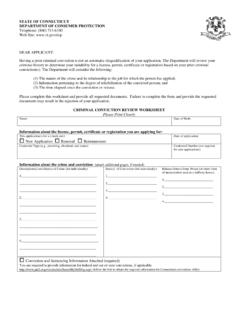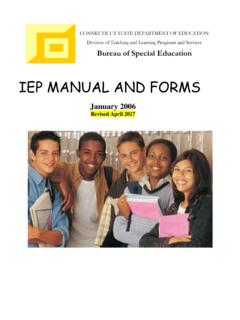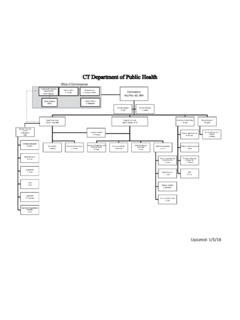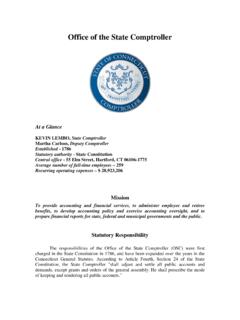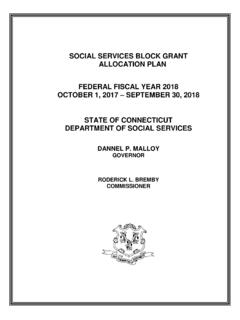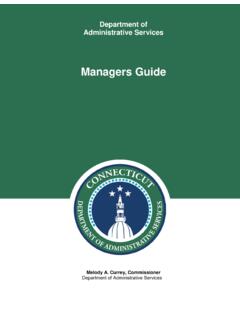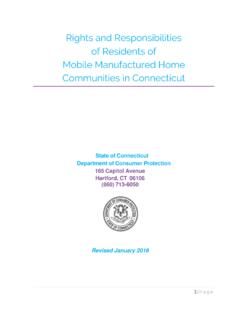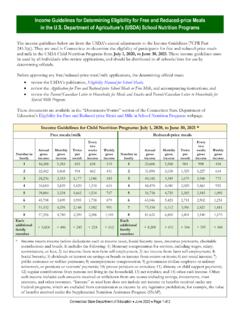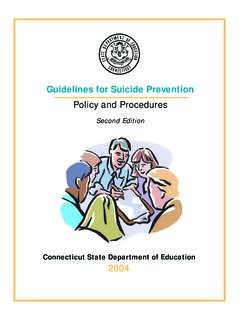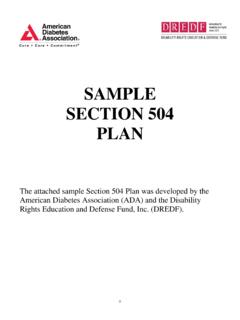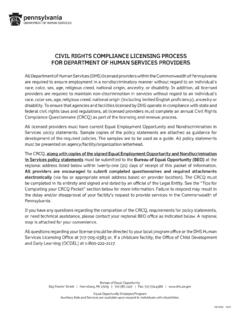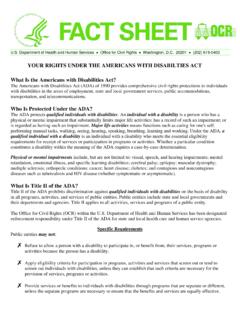Transcription of WRITING TRANSITION GOALS AND OBJECTIVES
1 Topic Brief WRITING TRANSITION GOALS and OBJECTIVES The TRANSITION planning process is driven through the development of a comprehensive IEP for each student. One of the greatest difficulties in the provision of quality TRANSITION services is that TRANSITION GOALS and OBJECTIVES have not, traditionally, driven the development of an IEP. TRANSITION planning in many instances, remains an afterthought.. Ask yourself a simple question: If we are to prepare students to successfully TRANSITION to the responsibilities of adult life, how can we accomplish this without knowing where the student is going? Understanding, defining and clarifying post-school dreams, visions and outcomes will give teams the foundation to begin to develop TRANSITION GOALS and OBJECTIVES that reflect what skills a student will need to achieve his/her GOALS . We need to re-think our approach at PPT meetings TRANSITION Planning Must Guide the Development of IEP's!
2 The TRANSITION component of the IEP must address the targeted post-school outcomes in each of the domains noted in IDEA: postsecondary education, vocational training, integrated employment (including supported employment), continuing and adult education, adult services, independent living and community participation. The post-school outcomes areas mandated under IDEA can be consolidated into the domains of: Postsecondary Education/Training Employment Independent Living/Community Participation Adapted from Connecticut's TRANSITION Training Manual and Resource Directory (September 2004) 11/3/06. CSDE 1 WTGO 3/16/07. Bureau of Special Education Questions To Ask Students: Employment: What kind of work would you like to do? What kind of training will you need for that work? What kind of environment would you enjoy working in? Will you need any supports on the job? Postsecondary Education: Are you interested in pursuing higher education after you leave high school?
3 Have you investigated the types of colleges/universities that would match your interests/needs/environment? What supports will you need to succeed in a postsecondary, academic environment? Independent Living: Where would you like to live (with your family, on your own, with a friend)? What kinds of skills will you need to make it happen (cooking, cleaning, using transportation)? How will you take care of your health needs? How will you manage financially? Community Participation: Will you be able to travel to work and pursue leisure activities in the community? Will you be able to access the services that can help you? Do you have hobbies and interests outside of school? Will they be enough to fill your leisure hours as an adult? How will you be able to find friends and maintain relationships with friends and family? Once you have the answers to some of these questions, you can begin to develop a framework for what life after school will look like for this student.
4 You will also have a better idea of what skills, experiences, and educational experiences must be integrated into the student's IEP. The following section contains an Objective Bank that can assist you in identifying potential areas of skills training for a student. While not exhaustive, it should provide you with some good ideas of the types of opportunities students will need in order to enhance their independence as an adult in whatever post - school environment that is appropriate. A special thanks to Simsbury High School for sharing their Objective Bank for adaptation. CSDE 2 WTGO 3/16/07. Bureau of Special Education Postsecondary Education Goal: Student will acquire the skills to successfully TRANSITION to a two-year or four-year college/university. OBJECTIVES : ___ Student will enroll in academic classes that will prepare him/her for the educational challenges of postsecondary education. ___ Student will meet with guidance counselor/special education teacher to discuss academic requirements of pursuing a college degree.
5 ___ Student will demonstrate skill in developing a positive school profile and resume that will be used in the college application process. ___ Student will participate in at least one extracurricular activity in order to develop nonacademic aspects of learning. ___ Student will describe their disability in terms of learning strengths and weaknesses. ___ Student will attend postsecondary options fairs, events, and group sessions provided by the school. ___ Student will participate in the traditional standardized tests necessary for acceptance to postsecondary institutions (PSAT's, SAT's, etc.). ___ Student will complete the paperwork necessary to take the SAT's with accommodations. ___ Student will schedule a visit with the Disability Services Coordinator for at least two colleges/universities to determine the levels of services available. ___ Student will describe the accommodations/modifications available to them in postsecondary settings.
6 ___ Student will explain the difference between protection under special education law (IDEA) and Section 504 of the Rehabilitation Act and the Americans with Disabilities Act. ___ Student will ensure that all evaluation data required by postsecondary institutions has been conducted and is within three years of graduation. ___ Student will receive direct skills training in becoming a positive self-advocate: ___ Learn whom to ask and when to ask for assistance. ___ Practice describing what is needed in order to become a successful student. ___ Develop and practice negotiation skills to help get what is wanted/needed. ___ Develop strategies for seeking assistance. ___ Discuss disability needs in the context of seeking accommodations. ___ Student will practice needed postsecondary education strategies: ___ Time management ___ Test preparation ___ Study partner/study group ___ Note-taking techniques ___ Special study locations ___ Stress reduction techniques ___ Text anxiety reduction activities ___ Student will develop the skills to organize their work with efficiency.
7 ___ Student will develop strategies to enhance their study skills. ___ Student will determine what testing, evaluation data is required by a postsecondary institution in order to receive needed accommodations. ___ Student will research resources within and outside the college to find support: ___ Determine if they are eligible for Vocational Rehabilitation Services (BRS). ___ Research private tutoring, if necessary. ___ Research Personal Care Assistance services, if necessary. ___ Student will submit a resume and postsecondary list of options to their guidance counselor by September, Grade 12. ___ Student will write a personal essay in the fall of Grade 12. ___ Student will investigate availability of financial aid and complete paperwork. CSDE 3 WTGO 3/16/07. Bureau of Special Education Career Awareness/Employment Goal: Student will complete a series of activities in order to prepare him/her to TRANSITION to competitive or supported employment.
8 OBJECTIVES : ___ Student will complete a series of formal and/or informal vocational assessment activities: ___ Career Interest Inventory ___ Learning Style Inventory ___ Student Interview ___ Parent Interview ___ Values/Maturity Inventory ___ Achievement Test ___ Psychological Tests ___ Student will define interests and abilities related to potential career and job opportunities. ___ Student will develop a career portfolio to compile all vocational-related materials. ___ Student will complete a minimum of two job reports on occupations of interest. ___ Student will complete a series of formal and/or informal vocational assessment activities. ___ Student will participate in _____ career trips to area businesses. ___ Student will participate in _____ school-based opportunities to hear guest speakers from career fields of their choice. ___ Student will identify primary and secondary career GOALS comparing the qualifications necessary for success in such occupations with his/her own abilities.
9 ___ Student will increase knowledge of general labor laws re: the employment of minors ( work permits, hours of work, minimum wage and jobs permitted for minors). ___ Student will demonstrate skills necessary to effectively locate, apply, interview and maintain employment. ___ Student will identify attitudes and behaviors necessary for job success. ___ Student will apply decision-making strategies to job-related issues. ___ Student will develop a personal resume. ___ Student will define TRANSITION GOALS related to competitive or supported employment postsecondary education and training, independent living, and community participation. ___ Student will refine TRANSITION GOALS related to employment, postsecondary education and training, independent living, and community participation. ___ Student will meet with adult service representatives to initiate referral process. ___ Student will meet with adult service representatives at least two times per school year to prepare for TRANSITION .
10 ___ Student will discuss job-related concerns and TRANSITION planning issues in vocational counseling sessions. ___ Student will complete _____ job-shadowing experiences related to expressed interests. ___ Student will successfully complete _____ school-supervised work experiences. ___ Student will demonstrate positive work habits and attitudes in school-based vocational settings. ___ Student will participate in _____ community-based internships in a career field of interest. ___ Student will demonstrate positive work habits and attitudes on community-based vocational training. ___ Student will complete _____ community-based job training experiences. ___ Student will self evaluate work behavior in community-based vocational settings. CSDE 4 WTGO 3/16/07. Bureau of Special Education Self-Advocacy Goal: Student will demonstrate self-advocacy skills in order to communicate learning style, academic and behavioral needs. ___ Student will complete a learning style inventory and be able to describe learning style.
